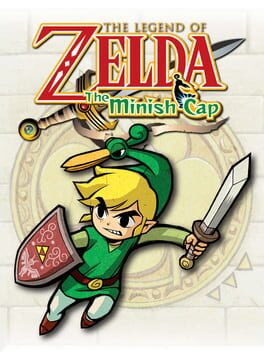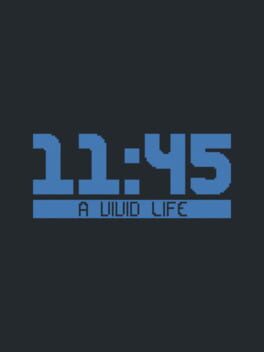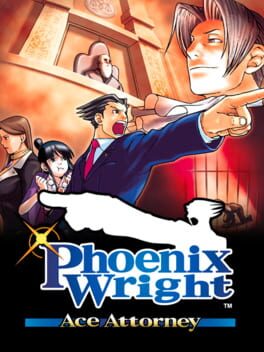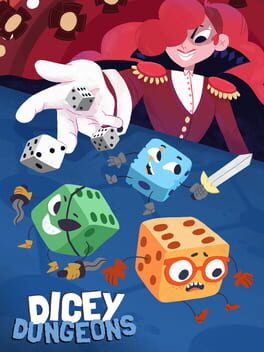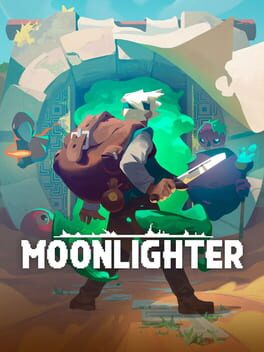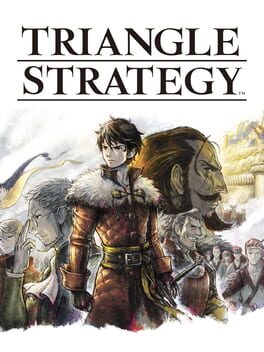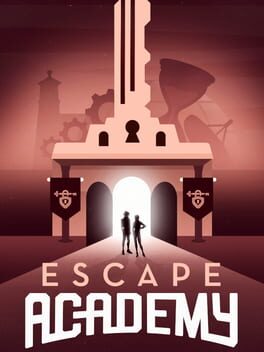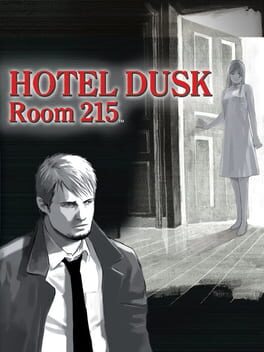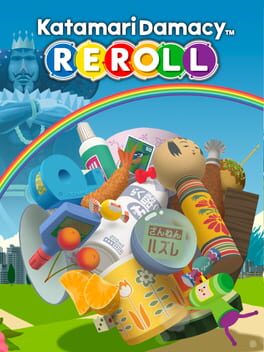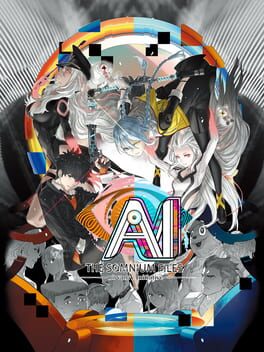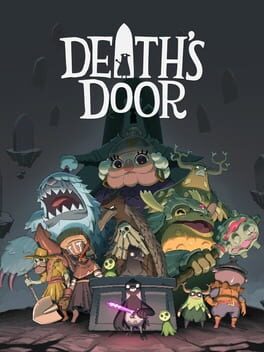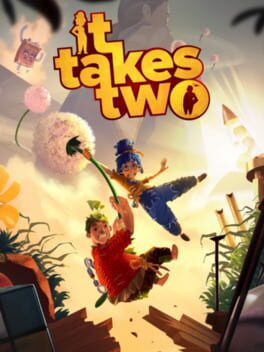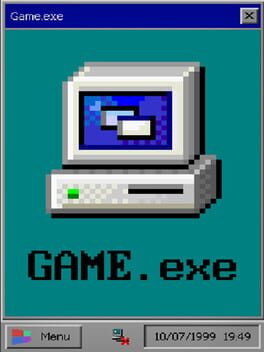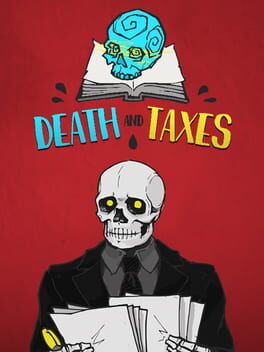javihollow
17 Reviews liked by javihollow
11:45 A Vivid Life
2018
Deconstructeam strikes again! I found this game deeply disturbing. I have a deep fear of cutting and dissecting, but the narrative had me hooked and made me endure, along with the character, the depiction of self-harm. The use of absence in how this game creates its story is fascinating: both what happens in the game and what is not told at all are key to understanding what is really taking place in this plot.
Choosing the different paths, guessing and even deciding for a narrative that made sense to the player was ingenious. Every option and path were secretive, with disturbing ramifications. I was blown away by the possibility of building a story from memories I was building in the moment.
I have personally had issues with both my body and mind seeming either someone else’s or just not mine at all. Finding a videogame that explores this idea was moving.
Choosing the different paths, guessing and even deciding for a narrative that made sense to the player was ingenious. Every option and path were secretive, with disturbing ramifications. I was blown away by the possibility of building a story from memories I was building in the moment.
I have personally had issues with both my body and mind seeming either someone else’s or just not mine at all. Finding a videogame that explores this idea was moving.
Dicey Dungeons
2019
Thank you raccoons4444 for the recommendation.
Not usually interested in Rouge-like/lites, but this one caught my attention. Dicey Dungeons oozes charm with its absurd setting and characters. I always enjoy it when a game has a crazy premise and just runs with it. Great fun mixing and matching different decks and each playable character feel completely different adding even more depth to the gameplay. Perfect game to play if you have a bit of time to kill. I will definitely be coming back to it every now and then.
Not usually interested in Rouge-like/lites, but this one caught my attention. Dicey Dungeons oozes charm with its absurd setting and characters. I always enjoy it when a game has a crazy premise and just runs with it. Great fun mixing and matching different decks and each playable character feel completely different adding even more depth to the gameplay. Perfect game to play if you have a bit of time to kill. I will definitely be coming back to it every now and then.
Moonlighter
2018
The best thing I can say about Moonlighter is that its pixel art is incredibly detailed and textured. Everything else about the game feels like video game comfort food.
The core loop involves selling items in your shop, to upgrade your equipment, and then find new items in dungeons to sell in your shop. Both the selling items and running through dungeon halves of the game are quick and rewarding enough to make you want to always do the next step. It feels very similar to the "just one more turn" feeling you get from being in the middle of a game of Civ. Unfortunately, one of those halves lacks enough teeth to make it interesting, while the other progresses way too slowly in complexity.
Combat in the game is an uncomfortable mix of modern 2d action game verbs (dodge rolls, switching weapons, elemental damage, etc) and classic Zelda action verbs (you attack the direction you're moving, no animation cancelling). It's a serviceable set of systems, but it never feels great to play. Often it feels like enemies are simply more nimble or versatile than you. All you can do is rely on damage output to compensate, which is easy enough to do. It's just not very frenetic or strategic, unlike a more thoughtful 2d action classic like Hades.
The selling systems are the real highlight of the game. It is extremely satisfying to find the right price for an item you're selling, then selling 10 of them at once for lots of money. There is a progression of more interesting mechanics than price setting as the game goes on. You can sell items for a high price with higher demand in display cases. You have to stop thieves from stealing your items. Customers can put in special orders. But i found this progression a little slow for my liking. By the time I got to the more interesting mechanics, I was making enough money to avoid penny-pinching, giving all these new systems way lower stakes. Your mileage may vary.
Here are other things I neglected to mention. The weapon upgrades are fairly shallow, making it less satisfying as time goes on. The townsfolk don't really do much aside from telling you canned phrases. The backpack mechanics are fairly thoughtful, and packing your bag while dungeon diving is usually a fun puzzle to engage in.
All in a, the whole game feels like indie comfort food. If you want a low low difficulty roguelite, this is a good option. Otherwise, I'd recommend Hades if you haven't given that a go.
The core loop involves selling items in your shop, to upgrade your equipment, and then find new items in dungeons to sell in your shop. Both the selling items and running through dungeon halves of the game are quick and rewarding enough to make you want to always do the next step. It feels very similar to the "just one more turn" feeling you get from being in the middle of a game of Civ. Unfortunately, one of those halves lacks enough teeth to make it interesting, while the other progresses way too slowly in complexity.
Combat in the game is an uncomfortable mix of modern 2d action game verbs (dodge rolls, switching weapons, elemental damage, etc) and classic Zelda action verbs (you attack the direction you're moving, no animation cancelling). It's a serviceable set of systems, but it never feels great to play. Often it feels like enemies are simply more nimble or versatile than you. All you can do is rely on damage output to compensate, which is easy enough to do. It's just not very frenetic or strategic, unlike a more thoughtful 2d action classic like Hades.
The selling systems are the real highlight of the game. It is extremely satisfying to find the right price for an item you're selling, then selling 10 of them at once for lots of money. There is a progression of more interesting mechanics than price setting as the game goes on. You can sell items for a high price with higher demand in display cases. You have to stop thieves from stealing your items. Customers can put in special orders. But i found this progression a little slow for my liking. By the time I got to the more interesting mechanics, I was making enough money to avoid penny-pinching, giving all these new systems way lower stakes. Your mileage may vary.
Here are other things I neglected to mention. The weapon upgrades are fairly shallow, making it less satisfying as time goes on. The townsfolk don't really do much aside from telling you canned phrases. The backpack mechanics are fairly thoughtful, and packing your bag while dungeon diving is usually a fun puzzle to engage in.
All in a, the whole game feels like indie comfort food. If you want a low low difficulty roguelite, this is a good option. Otherwise, I'd recommend Hades if you haven't given that a go.
Triangle Strategy
2022
Escape Academy
2022
This is one of those great GamePass stories, where a game I didn’t even know existed before Wednesday quickly became one of my personal favorites of 2022, as Escape Academy oozes over with the kind of Escape Room charm I once thought could only be achieved in a physical space. The premise of this game is simple—you are training to become a great escape artist, and find yourself in increasingly violent scenarios from which you must escape during your training. The characters and story are not what this game is about, but they were fun and had some clever contrasts in their characterization. However, this game shines most in its puzzle design. This game was actually created by Escape Room designers who feared for their future when COVID hit, so the puzzles all have that unique interconnectedness that I’ve only experienced in physical escape rooms. I loved finding out which element of the room was necessary to solve the next sequence, and I always felt clever when I found the solution that the game clearly had designed for me to find. The only thing this game lacked was the maneuverability of objects in real space… You don’t even have the ability to to rotate items to find hidden crevices or anything, which means the puzzle solutions must present themselves to you a bit more obviously from the first glance at an item. Still, I’m so glad this game came to GamePass, because I probably would have never heard of it otherwise.
Hotel Dusk: Room 215
2007
nirvana initiative is some of uchikoshi's strongest work, but never seems to transcend or challenge his style or abilities as a writer. coming off of the far more character driven somnium files, i had anticipated that this would further break the mold and defy expectations that the author had previously set. thankfully, what's here is incredibly good because it's just more somnium files.
starting a bit after the first title, nirvana initiative almost immediately grabs the player by showing a shocking murder that seems to be unstuck in time. as early as the scenario of two halves of one corpse appearing at different moments of time was revealed as the set up for the sequel, i was very hooked. so hooked it made me play the original just to see where it went. i don't want to divulge too much narratively, but i found myself very satisfied with how the mystery played out.
the game plays pretty much 1:1 with the previous release, just with some obvious budgetary and QOL with a brand new perspective on the puzzle design. uchikoshi only wrote this game, so his trademark esoteric puzzle design isn't here. the somniums in this title are all much more varied than the escape rooms from the first title, ranging from a riff on pokemon go to stealthing around a secret lab to literally diving deeper and deeper into a cult leader's pyschosis. none of them were particularly challenging, but they all felt very inspired. only a few hours in and i could tell that what the actual mindset of what somniums are designed to accomplish in the story is entirely different than before. there are good things about this, like how they don't feel so samey in terms of how to execute them, but i had a hard time justifying why we were diving into this character's pysche at this point in the story pretty frequently, especially in Mizuki's half of the story.
the story is split (as are many things) down the middle between a few months after the first title, where a new member of ABIS and his new AIBall Tama are tasked with hunting down the half body serial killings. new victims pile up and ryuki, our hero, begins to sink deeper and deeper into an obsessive psychosis regarding the killings. after that route ends, we just six years into the future where the other half of the other victims all start popping up. here we play as Mizuki, my favorite character from the last game, who is joined by Aiba. both duos have great chemistry, but i shockingly found myself way more invested in tama and ryuki than mizuki and aiba. in keeping with the first, the game also has a downright fantastic new cast of characters along with returning favorites. greg chun is having the time of his life playing Date, and new characters like komeji and gen really hit it out of the park with a shocking amount of pathos. i only really didn't care for kizuna and lien, but they ended up being tolerable by the end so it's fine. i guess.
part of me hates to say that i was a little disappointed with the increased scope and the return to a more twist-driven story, but it thankfully doesn't go full zero escape in the ways that annoyed me about that series. there's a lot more brainy pseudoscience in here than there was in somnium files but it thankfully never drowns out the amazing character stuff or murder mystery at the core of the story. it threatens at a few points to buckle under an increasingly "unsolvable" feeling mystery, but manages to stay the course but handwaving the details away in service of letting the characters have the spotlight.
also i think more games should just end on big dance numbers. uchikoshi is unbeatable for doing it twice, that's true Playa Mindset.
starting a bit after the first title, nirvana initiative almost immediately grabs the player by showing a shocking murder that seems to be unstuck in time. as early as the scenario of two halves of one corpse appearing at different moments of time was revealed as the set up for the sequel, i was very hooked. so hooked it made me play the original just to see where it went. i don't want to divulge too much narratively, but i found myself very satisfied with how the mystery played out.
the game plays pretty much 1:1 with the previous release, just with some obvious budgetary and QOL with a brand new perspective on the puzzle design. uchikoshi only wrote this game, so his trademark esoteric puzzle design isn't here. the somniums in this title are all much more varied than the escape rooms from the first title, ranging from a riff on pokemon go to stealthing around a secret lab to literally diving deeper and deeper into a cult leader's pyschosis. none of them were particularly challenging, but they all felt very inspired. only a few hours in and i could tell that what the actual mindset of what somniums are designed to accomplish in the story is entirely different than before. there are good things about this, like how they don't feel so samey in terms of how to execute them, but i had a hard time justifying why we were diving into this character's pysche at this point in the story pretty frequently, especially in Mizuki's half of the story.
the story is split (as are many things) down the middle between a few months after the first title, where a new member of ABIS and his new AIBall Tama are tasked with hunting down the half body serial killings. new victims pile up and ryuki, our hero, begins to sink deeper and deeper into an obsessive psychosis regarding the killings. after that route ends, we just six years into the future where the other half of the other victims all start popping up. here we play as Mizuki, my favorite character from the last game, who is joined by Aiba. both duos have great chemistry, but i shockingly found myself way more invested in tama and ryuki than mizuki and aiba. in keeping with the first, the game also has a downright fantastic new cast of characters along with returning favorites. greg chun is having the time of his life playing Date, and new characters like komeji and gen really hit it out of the park with a shocking amount of pathos. i only really didn't care for kizuna and lien, but they ended up being tolerable by the end so it's fine. i guess.
part of me hates to say that i was a little disappointed with the increased scope and the return to a more twist-driven story, but it thankfully doesn't go full zero escape in the ways that annoyed me about that series. there's a lot more brainy pseudoscience in here than there was in somnium files but it thankfully never drowns out the amazing character stuff or murder mystery at the core of the story. it threatens at a few points to buckle under an increasingly "unsolvable" feeling mystery, but manages to stay the course but handwaving the details away in service of letting the characters have the spotlight.
also i think more games should just end on big dance numbers. uchikoshi is unbeatable for doing it twice, that's true Playa Mindset.
Death's Door
2021
Death's Door is a game full of charm, set in a beautiful yet dark world with so many intriguing characters to meet.
It nails the presentation as the game looks amazing and the music is fantastic. I loved exploring each area as there were so many secrets waiting to be discovered. They managed to make each area very different from the next with the visual, however, with the gameplay I did find each area played out the same and this made the game a little bit repetitive for me at times.
I found the combat fun even if it is quite simplistic. For me the most enjoyable part of the game was the boss fights as this is where the combat is at its best. They are challenging but fair at the same time, I never found any of my deaths to be cheap and it was usually a mistake I had made. The bosses are all very well designed and can kick your arse at times if you're not careful, my only complaint was there weren't more of them.
Overall I had fun playing Death's Door.
I can't make any comparisons to the Zelda games as I haven't played many (I'm sorry, I'm working on it!) but that won't stop me from recommending this game.
It nails the presentation as the game looks amazing and the music is fantastic. I loved exploring each area as there were so many secrets waiting to be discovered. They managed to make each area very different from the next with the visual, however, with the gameplay I did find each area played out the same and this made the game a little bit repetitive for me at times.
I found the combat fun even if it is quite simplistic. For me the most enjoyable part of the game was the boss fights as this is where the combat is at its best. They are challenging but fair at the same time, I never found any of my deaths to be cheap and it was usually a mistake I had made. The bosses are all very well designed and can kick your arse at times if you're not careful, my only complaint was there weren't more of them.
Overall I had fun playing Death's Door.
I can't make any comparisons to the Zelda games as I haven't played many (I'm sorry, I'm working on it!) but that won't stop me from recommending this game.
It Takes Two
2021
Boyfriend Dungeon
2021
I am so conflicted about this game. It is designed for the queer community and has been heavily scrutinized. This is often the case as the queer experience is not universal - we tend to want to critique things that do not fit the definitions we have forged from our own trauma. I can appreciate what this game does. It opens the door for polyamory, exploring intimacy with and without sex and it also sometimes forces you to face rejection. In this way, it does a good job of emulating the mess and wake of human relationships. It also has some genuinely funny moments, many of which are hinged on the game's primary conceit - you smooch swords.
However! It is deeply unfortunate that this game is just sort of... Mediocre on all fronts. It tries to do so many things between the genre mash up and the cast of characters that it doesn't do anything masterfully. The action RPG is truly just button mashing. At times the writing for dialogue feels rushed or cut short. The hype for this game has certainly worked against it. Everyone was looking for it to be so much more than it was.
Of course there is the stalker character and the controversy surrounding him. While I don't think that developers should shy away from topics that could make people uncomfortable, it needs to be done with a little finesse. In this instance, the character... is simply not written well. His character arc resolution is not believable. At times you are forced to interact with him, even by your own cousin. Another aspect of this game which suffered from its brevity and lack of depth.
Overall, I did enjoy my time at Verona Beach and I maxed out each weapon just wanting to get to know them. It is a step towards queer representation and an interesting concept. I just wish the execution was as good as the premise.
However! It is deeply unfortunate that this game is just sort of... Mediocre on all fronts. It tries to do so many things between the genre mash up and the cast of characters that it doesn't do anything masterfully. The action RPG is truly just button mashing. At times the writing for dialogue feels rushed or cut short. The hype for this game has certainly worked against it. Everyone was looking for it to be so much more than it was.
Of course there is the stalker character and the controversy surrounding him. While I don't think that developers should shy away from topics that could make people uncomfortable, it needs to be done with a little finesse. In this instance, the character... is simply not written well. His character arc resolution is not believable. At times you are forced to interact with him, even by your own cousin. Another aspect of this game which suffered from its brevity and lack of depth.
Overall, I did enjoy my time at Verona Beach and I maxed out each weapon just wanting to get to know them. It is a step towards queer representation and an interesting concept. I just wish the execution was as good as the premise.
Game.exe
2021
GAME.exe is a bite-sized, 20 minute experience. It’s the sort of thing you play between larger time commitments to cool down. And although it's heavily flawed, there are definitely a few things to appreciate about it. The presentation is well-done, and there’s a few solid ideas within the story. It’s a commendable first attempt at a game by new developers.
However, there are still many things for these devs to learn and improve upon - and those aforementioned positives don’t necessarily make it worth the money. This leads into my main issue with GAME.exe… the price tag.
2.99 is just too much to ask for when what you provide is so shallow and short. Now, I don’t think games should be priced based solely on their length - but there’s just very little to this one. There’s no replay value, no mechanical/story depth, and nothing to give a second thought after the credits.
Even more egregious is that the original price was 6.99. I appreciate that the devs did drop it down to something more reasonable, but I still think the current price is too much. If it were free, I’d be much more willing to recommend people give it a try.
Ultimately, GAME.exe provides a slightly intriguing - but forgettable and throwaway - experience. I still hope that it was a learning process for the devs, and that they continue to hone their craft. I’d like to see something from them again.
SHORT REVIEW
Visuals: 3.5/5
Sound: 4/5
Story: 1/5
Gameplay: 1/5
Worldbuilding: 1/5
Overall Score: 2/5 [2.1/5]
VISUALS
The visual style of GAME.exe is probably its strongest talking point. Its classic Windows 98 look is very well-made; there's nice program icons, bold fonts, and a handful of default backgrounds to choose from. It's nostalgic and simple - a great choice for first-time devs.
But the best thing about this aspect of GAME.exe is Oliver’s project itself - the game within the game. It harkens back to the stuff from his era, taking inspiration from well-known and beloved late 90s/early 2000s releases. It's like a tiny slice of Silent Hill or System Shock. This isn’t as well-executed as those, of course, but it's a very cool design direction to see in 2021.
Overall, 3.5/5.
SOUND
The sound effects are similarly pleasing, with satisfying clicking noises, modem whirring, and the like. There’s also a surprising amount of music to accompany you on your short journey. The soundtrack sports almost surreal vibes, with its fuzzy-sounding and nostalgia-inducing tunes. Much of it makes use of string instruments, piano, and almost mechanical noises - a much more unique approach than the ever-popular chiptune/electronic style that many indie devs use. That’s not to say that those aren’t great genres, of course, but I have to praise GAME.exe for standing out.
Although it’s copyright/royalty-free music that the devs found online, I have to give them credit for using something so out of the ordinary. The artist, Ross Bugden, is very talented.
Overall, 4/5.
STORY
This is where things start to get a bit hairy.
The basis of GAME.exe’s plot is cliche, but it’s interesting enough. A dev by the name of Oliver committed suicide while working on his dream game, and you have bought his computer from a thrift shop. However, you quickly discover that he has literally put his soul into the project, causing your almost-new computer to become possessed by its former owner. He now takes the form of a black monster with red eyes that chases you through the GAME.exe.
Creepypasta cheesiness aside, it’s a neat idea for a story in the computer simulation genre. The problem lies in its execution.
To start with, the writing is not very good. A lot of it comes across as slightly stilted English translations. It’s all very close to being correct, but there’s something just a little off about it.
More egregious than that, though, is GAME.exe’s lack of subtlety; Oliver messages you himself, telling you all the plot details in one big, unnatural exposition dump. There’s no trust in the player to read between the lines. But then again, there’s no lines to read between here. The game lacks any sort of detail.
There’s an inexcusable number of plotholes for something this short, too. Oliver tells you that he’s killed other people, but we’re never shown who, how, or why. He says the player is ‘making him’ kill, but that’s never elaborated on further. We’re never told the details of why he commits suicide, or when it happened; did he do it with the intention of becoming part of his project, or was this an unfortunate side effect?
There’s so many ideas that could have added to the intrigue and mystery of GAME.exe, but it’s all overlooked. I don’t expect a scientific explanation for how a man traps his soul in a computer - I just feel like there are a lot of things that could have been given more thought.
Overall, 1/5.
GAMEPLAY
Similarly to the story, there's so much that could’ve been done with the gameplay that’s just thrown to the side. It’s very interesting to imagine the computer itself working against you; unfortunately, this isn’t built on much. Despite his soul being in the computer, Oliver presents only a few inconvenient roadblocks. The ‘moving confirmation box’ he does at one point is reused for random trojans that you can get - which didn’t even happen to me on my first playthrough, and I only found out about through watching a Youtube video.
There’s almost no puzzles to solve, either. It’s unfortunate, because I feel like this could’ve been a good puzzle game. Computer/phone simulators often have puzzles as their main mechanic, so it’s strange to me that this one doesn’t. Another missed opportunity.
Lastly, Oliver’s game - while simple and derivative - is fine enough for what it is. It’s supposed to be unfinished and mediocre, so I’ll give the devs leniency in this regard. Besides, it’s a nice and tense little section of the overall experience; the loud sound effects and stamina bar may be trope-y, but they work well enough.
Overall, 1/5.
WORLDBUILDING
As good as its presentation is, the only actual worldbuilding GAME.exe attempts are a few chat logs between Oliver and others. Even then, most of them provide almost no background for Oliver outside of the project. The only interesting tidbit is that there was a girl he seemed to like who didn't like him back. Other than that, all of the messages are forgettable, random nonsense. You’re telling me there was no one in Oliver’s life who checked up on him? No internet friends wondering why he’d disappeared after his death?
Computer/phone simulation is such an easy genre to take advantage of when it comes to worldbuilding and character history; yet, GAME.exe doesn’t even try. There’s little on the computer relating to anything outside of Oliver’s project - and while I understand that that’s the core of the plot, proper characterization and lore would have gone a long way in expanding said plot.
Overall, 1/5.
Overall game score: 2/5 [2.1/5]. It’s sad that something with above-average presentation and a few good ideas ended up being so lackluster. But, like I said, this is pretty good for brand new devs. Others have done much, much worse for their first release.
I wish Amaro Studios the best of luck in improving, learning, and eventually launching something better. GAME.exe tells me that they may have the chops to be up for the challenge.
However, there are still many things for these devs to learn and improve upon - and those aforementioned positives don’t necessarily make it worth the money. This leads into my main issue with GAME.exe… the price tag.
2.99 is just too much to ask for when what you provide is so shallow and short. Now, I don’t think games should be priced based solely on their length - but there’s just very little to this one. There’s no replay value, no mechanical/story depth, and nothing to give a second thought after the credits.
Even more egregious is that the original price was 6.99. I appreciate that the devs did drop it down to something more reasonable, but I still think the current price is too much. If it were free, I’d be much more willing to recommend people give it a try.
Ultimately, GAME.exe provides a slightly intriguing - but forgettable and throwaway - experience. I still hope that it was a learning process for the devs, and that they continue to hone their craft. I’d like to see something from them again.
SHORT REVIEW
Visuals: 3.5/5
Sound: 4/5
Story: 1/5
Gameplay: 1/5
Worldbuilding: 1/5
Overall Score: 2/5 [2.1/5]
VISUALS
The visual style of GAME.exe is probably its strongest talking point. Its classic Windows 98 look is very well-made; there's nice program icons, bold fonts, and a handful of default backgrounds to choose from. It's nostalgic and simple - a great choice for first-time devs.
But the best thing about this aspect of GAME.exe is Oliver’s project itself - the game within the game. It harkens back to the stuff from his era, taking inspiration from well-known and beloved late 90s/early 2000s releases. It's like a tiny slice of Silent Hill or System Shock. This isn’t as well-executed as those, of course, but it's a very cool design direction to see in 2021.
Overall, 3.5/5.
SOUND
The sound effects are similarly pleasing, with satisfying clicking noises, modem whirring, and the like. There’s also a surprising amount of music to accompany you on your short journey. The soundtrack sports almost surreal vibes, with its fuzzy-sounding and nostalgia-inducing tunes. Much of it makes use of string instruments, piano, and almost mechanical noises - a much more unique approach than the ever-popular chiptune/electronic style that many indie devs use. That’s not to say that those aren’t great genres, of course, but I have to praise GAME.exe for standing out.
Although it’s copyright/royalty-free music that the devs found online, I have to give them credit for using something so out of the ordinary. The artist, Ross Bugden, is very talented.
Overall, 4/5.
STORY
This is where things start to get a bit hairy.
The basis of GAME.exe’s plot is cliche, but it’s interesting enough. A dev by the name of Oliver committed suicide while working on his dream game, and you have bought his computer from a thrift shop. However, you quickly discover that he has literally put his soul into the project, causing your almost-new computer to become possessed by its former owner. He now takes the form of a black monster with red eyes that chases you through the GAME.exe.
Creepypasta cheesiness aside, it’s a neat idea for a story in the computer simulation genre. The problem lies in its execution.
To start with, the writing is not very good. A lot of it comes across as slightly stilted English translations. It’s all very close to being correct, but there’s something just a little off about it.
More egregious than that, though, is GAME.exe’s lack of subtlety; Oliver messages you himself, telling you all the plot details in one big, unnatural exposition dump. There’s no trust in the player to read between the lines. But then again, there’s no lines to read between here. The game lacks any sort of detail.
There’s an inexcusable number of plotholes for something this short, too. Oliver tells you that he’s killed other people, but we’re never shown who, how, or why. He says the player is ‘making him’ kill, but that’s never elaborated on further. We’re never told the details of why he commits suicide, or when it happened; did he do it with the intention of becoming part of his project, or was this an unfortunate side effect?
There’s so many ideas that could have added to the intrigue and mystery of GAME.exe, but it’s all overlooked. I don’t expect a scientific explanation for how a man traps his soul in a computer - I just feel like there are a lot of things that could have been given more thought.
Overall, 1/5.
GAMEPLAY
Similarly to the story, there's so much that could’ve been done with the gameplay that’s just thrown to the side. It’s very interesting to imagine the computer itself working against you; unfortunately, this isn’t built on much. Despite his soul being in the computer, Oliver presents only a few inconvenient roadblocks. The ‘moving confirmation box’ he does at one point is reused for random trojans that you can get - which didn’t even happen to me on my first playthrough, and I only found out about through watching a Youtube video.
There’s almost no puzzles to solve, either. It’s unfortunate, because I feel like this could’ve been a good puzzle game. Computer/phone simulators often have puzzles as their main mechanic, so it’s strange to me that this one doesn’t. Another missed opportunity.
Lastly, Oliver’s game - while simple and derivative - is fine enough for what it is. It’s supposed to be unfinished and mediocre, so I’ll give the devs leniency in this regard. Besides, it’s a nice and tense little section of the overall experience; the loud sound effects and stamina bar may be trope-y, but they work well enough.
Overall, 1/5.
WORLDBUILDING
As good as its presentation is, the only actual worldbuilding GAME.exe attempts are a few chat logs between Oliver and others. Even then, most of them provide almost no background for Oliver outside of the project. The only interesting tidbit is that there was a girl he seemed to like who didn't like him back. Other than that, all of the messages are forgettable, random nonsense. You’re telling me there was no one in Oliver’s life who checked up on him? No internet friends wondering why he’d disappeared after his death?
Computer/phone simulation is such an easy genre to take advantage of when it comes to worldbuilding and character history; yet, GAME.exe doesn’t even try. There’s little on the computer relating to anything outside of Oliver’s project - and while I understand that that’s the core of the plot, proper characterization and lore would have gone a long way in expanding said plot.
Overall, 1/5.
Overall game score: 2/5 [2.1/5]. It’s sad that something with above-average presentation and a few good ideas ended up being so lackluster. But, like I said, this is pretty good for brand new devs. Others have done much, much worse for their first release.
I wish Amaro Studios the best of luck in improving, learning, and eventually launching something better. GAME.exe tells me that they may have the chops to be up for the challenge.
Death and Taxes
2020
Death and Taxes has large aspirations, but doesn't really have the confidence to see them through. It (unashamedly, considering the direct reference) bears a very similar resemblance to Papers, Please (hereby referred to as "PP" since it will probably be brought up a lot) in it's gameplay and narrative, but doesn't reach the same potential in a lot of ways.
I'll start with the gameplay, since there isn't much to speak of. You get a list of requirements unique to each day, and a list of papers you need to file in congruence with those said requirements. For the first few days this does have some light puzzle solving elements, but very quickly it derails itself to try and pull on heartstrings instead. By the halfway point, days start going by quicker than the cutscenes, and it's not much better for it.
That's because the writing is not very good. Like it's inspiration, Death and Taxes tries to make your mundane busywork into an emotionally and morally complex story, but unlike PP it fails for a couple reasons. I'll try my best to avoid direct PP comparisons.
My main problem is the sheer disconnect, since in D&T you're working literally from the top of an ivory tower, completely detached from every person you sentence to death. As the game goes on the world supposedly gets worse, but you literally cannot see it outside of maybe the sky sprite changing to different shades. Your actions have almost no consequence, so there is absolutely no reason to do anything but what you're told, considering that gives you (equally useless) money.
My other problem is the main character: Fate. That's not who you play as, but your character has effectively no personality since dialogue trees will always be the same and could possibly involve your character randomly spouting "I like ice cream." No, Fate is the character you refer to throughout the game that routinely either scolds you for following instructions or for not following instructions, seemingly at random. He has a character arc, I suppose, but it's not particularly compelling or interesting. Without spoiling too much, he essentially progessively builds up the courage to say "fuck it," leaving you with your thumb in your ass with the game smugly saying "wow, don't YOU feel like an asshole."
That's kinda my biggest problem with it. It feels like it has an idea, and at times in the early hours I could feel at least a bit of tough decisions being made, but it tries so hard to look smart without really having the confidence to say anything. Despite all that, though, it is charming and I have a hard time saying I actually hate it.
Also the credits are framed as the "Live or Die" paperwork you file throughout the game and I really wonder if the devs keep track of who kills and spares them
I'll start with the gameplay, since there isn't much to speak of. You get a list of requirements unique to each day, and a list of papers you need to file in congruence with those said requirements. For the first few days this does have some light puzzle solving elements, but very quickly it derails itself to try and pull on heartstrings instead. By the halfway point, days start going by quicker than the cutscenes, and it's not much better for it.
That's because the writing is not very good. Like it's inspiration, Death and Taxes tries to make your mundane busywork into an emotionally and morally complex story, but unlike PP it fails for a couple reasons. I'll try my best to avoid direct PP comparisons.
My main problem is the sheer disconnect, since in D&T you're working literally from the top of an ivory tower, completely detached from every person you sentence to death. As the game goes on the world supposedly gets worse, but you literally cannot see it outside of maybe the sky sprite changing to different shades. Your actions have almost no consequence, so there is absolutely no reason to do anything but what you're told, considering that gives you (equally useless) money.
My other problem is the main character: Fate. That's not who you play as, but your character has effectively no personality since dialogue trees will always be the same and could possibly involve your character randomly spouting "I like ice cream." No, Fate is the character you refer to throughout the game that routinely either scolds you for following instructions or for not following instructions, seemingly at random. He has a character arc, I suppose, but it's not particularly compelling or interesting. Without spoiling too much, he essentially progessively builds up the courage to say "fuck it," leaving you with your thumb in your ass with the game smugly saying "wow, don't YOU feel like an asshole."
That's kinda my biggest problem with it. It feels like it has an idea, and at times in the early hours I could feel at least a bit of tough decisions being made, but it tries so hard to look smart without really having the confidence to say anything. Despite all that, though, it is charming and I have a hard time saying I actually hate it.
Also the credits are framed as the "Live or Die" paperwork you file throughout the game and I really wonder if the devs keep track of who kills and spares them
